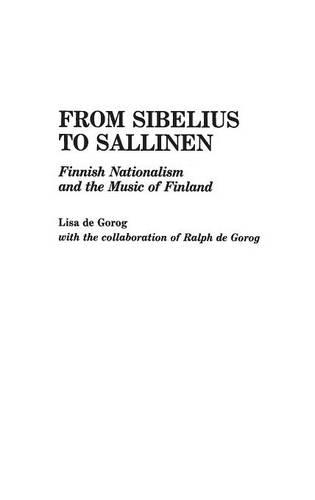
From Sibelius to Sallinen: Finnish Nationalism and the Music of Finland
(Hardback)
Publishing Details
From Sibelius to Sallinen: Finnish Nationalism and the Music of Finland
By (Author) Lisa De Gorog
Bloomsbury Publishing PLC
Praeger Publishers Inc
6th December 1989
United States
Classifications
Tertiary Education
Non Fiction
Musicians, singers, bands and groups
Composers and songwriters
780.948970904
Physical Properties
Hardback
261
Description
This comprehensive study of the evolution of Finnish art music from continental predecessors and native folk music traces the development of Sibelius's musical language from his first major work, "Kullervo", the first genuine Finnish recitative, to the last tone poem, "Tapiola". De Gorog asserts the importance of "En Saga", Sibelius's first major, purely orchestral work, as a composition that affirms the composer's belief in both rhythm and in the variation method (the germ motif technique). The impact of folk music on the germ motif technique as well as on melody, phrase construction, and harmony are also analyzed. Although Sibelius's use of rhythm was more restrained than that of Bartok, Stravinsky, or Prokofiev, similarities in basic trends and folk music influences are noted by de Gorog. "From Sibelius to Sallinen" emphasizes the importance of various aspects of Finnish culture, the historical events that shaped that culture, and Finnish nationalism in the evolution of Finnish music in general. It also delineates the major sources of inspiration for Sibelius's unique musical idiom. The volume clarifies Sibelius's position as founder of Finnish art music and considers the evolution of trends established by him in the works of younger Finnish composers. Lisa De Gorog is a writer with a special interest in cultural history Celestina" and "Concordancias del Arciprests de Talavera", both with Ralph de Gorog.
Reviews
. . .this survey of Finnish music ia arguable the most important and certainly the most thoroughly researched text of its kind in the English language. Much of the work's effectiveness is due to the author's use of a broad historical, cultural, and analytical approach to the music of Sibelius and to the development of stylistic trends in Finnish music in general. Finally, the authors; presentation of diverse viewpoints as well as her own fresh perspectives reflects a well-rounded orientation that should serve as a model for those doing further research in Finnish music.-Comptes-Rendus
The first third of this book provides an overview of the cultural struggles of the Finns to become a nation linguistically and politically separate from the domination of the Russians and the Swedes. The next four chapters deal with the music of Sibelius with special emphasis on the rhythms of Finnish poetry and speech and their influence on his instrumental music. A single chapter is devoted to a quick survey of post-Sibelian Scandinavian composers (mostly Finnish) with brief prose descriptions of their music. The final chapter, which seems something of an appendage, traces the history of Finnish theater and vocal music. The bibliography is particularly helpful for those who wish to pursue their study of Finnish history in more depth. Of considerable interest is the extensive discography of recorded works of a large number of Scandinavian composers, most of whom are all but unknown in the US. Upper-division undergraduate and graduate collections.-Choice
." . .this survey of Finnish music ia arguable the most important and certainly the most thoroughly researched text of its kind in the English language. Much of the work's effectiveness is due to the author's use of a broad historical, cultural, and analytical approach to the music of Sibelius and to the development of stylistic trends in Finnish music in general. Finally, the authors; presentation of diverse viewpoints as well as her own fresh perspectives reflects a well-rounded orientation that should serve as a model for those doing further research in Finnish music."-Comptes-Rendus
"The first third of this book provides an overview of the cultural struggles of the Finns to become a nation linguistically and politically separate from the domination of the Russians and the Swedes. The next four chapters deal with the music of Sibelius with special emphasis on the rhythms of Finnish poetry and speech and their influence on his instrumental music. A single chapter is devoted to a quick survey of post-Sibelian Scandinavian composers (mostly Finnish) with brief prose descriptions of their music. The final chapter, which seems something of an appendage, traces the history of Finnish theater and vocal music. The bibliography is particularly helpful for those who wish to pursue their study of Finnish history in more depth. Of considerable interest is the extensive discography of recorded works of a large number of Scandinavian composers, most of whom are all but unknown in the US. Upper-division undergraduate and graduate collections."-Choice
Author Bio
LISA DE GOROG is a writer with a special interest in cultural history and musicology. A native of Finland, she has taught both subjects in Finland and in Athens, Georgia, where she currently resides. Her previous works include La Sinonimia en La Celestina and Concordancias del Arcipreste de Talavera, both with Ralph de Gorog.
